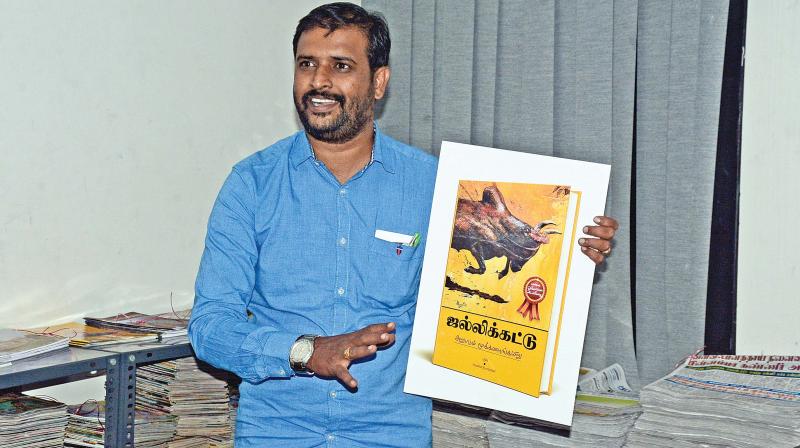Ex-techie's book on jallikattu to be released

Chennai: It was a complete change in perception for Saravanan Thyagarajan, a former IT employee, who aggressively toured Tamil Nadu to know about the socio-cultural and economic consequences in the agrarian state, two years after the bull taming sport, jallikattu was prohibited.
His insights which clubs the scientific facts and ground reports from the rural Tamil Nadu encouraged the 35-year-old Chennai resident to author a book called Jallikattu — Arubadum Mookanangairu. The book whose cover was released by Senthamizhan Seeman, chief coordinator of Naam Tamilar Katchi would be released at the Chennai Book fair on Saturday at 12 noon.
Engaging and masculine portraits of jallikattu bulls by artist Muralidharan Alagar sends a mute message of the repercussions of jallikattu ban, as well as depicting the majesty in the traditional sport, the inscriptions of which is found in the Indus Valley civilization. A mystery author called Puthir has contributed to the spiritual aspects of the sport, touching about the symbiotic relationship between the bull and the man, the prowess in standing out and the respect rendered to bulls in religious contexts.
Rubbishing the rumours that the sport portrays casteism, Saravanan said, "It is practiced by people from all the religions. For example, Christians practised jallikattu in Kosavapatti, Pugaiyilai patty and Thavasimadai of Dindugal whereas Muslims at Kaliyamangalam Dharga of Madurai were regularly taking part."
Flipping through the pages of his maiden venture, Saravanan Thyagarajan anecdotes, "Prohibition of jallikattu will directly affect the survival of powerful bulls. According to the statistics from Animal husbandry, there is a steep decline in the population of native breeds, including Alambadi, which is sparsely found in Krishnagiri district."
Asserting the reasons by Peta in banning the bull taming sport, Saravanan terms the move as 'strategic' as it indirectly benefits the corporate sector - be it from escalating the artificial insemination or taking away the milk business from the hands of petty farmers.
"While powerful, native bulls are getting extinct, the business of artificial insemination can thrive in the pretext of developing the hybrid breeds. High sugar level milk produced through the non-resilient hybrid breeds (A1variety) is a boost to the Indian medical industry, at the cost of public health," explained Saravanan.
Cows and bulls from the artificial insemination could produce a large quantity of milk, but they cannot conceive more than four times, unlike the native breeds. This scenario flourishes the meat industry, Saravanan states in his book.
Echoing the residents' anguish, Saravanan said that there is a unanimous crave among them to perform the sport this year. "We missed it for two years, believing that the court would do justice. But nothing can resist us this time," he was told.
In an ending note, the author said that those fighting for jallikattu are ordinary, genuine people unlike the high profiled advocates representing Peta in the Supreme Court.

